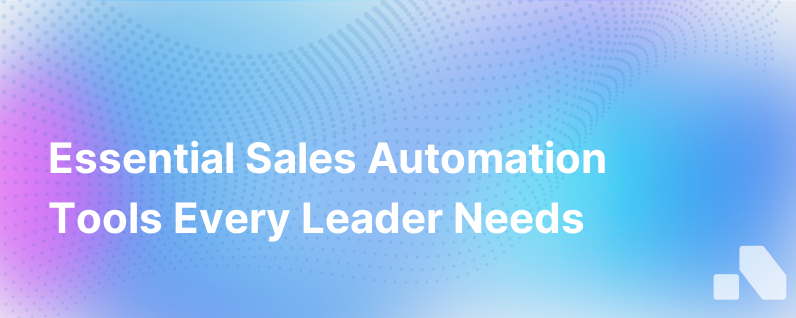
Sales professionals are under constant pressure to hit their numbers, chase leads, and close deals—all while providing a personalized experience for each prospect. In an environment where time is money, sales automation tools are essential to streamline processes, save time, and boost efficiency. Here we dive into the world of sales automation: what it is, why it's important, and what tools are indispensable for a seamless sales operation.
Understanding Sales Automation
Sales automation refers to the process of using software to automate manual, repetitive sales activities. These tasks can range from lead assignment to updating CRM records, setting up meetings, and even nurturing leads. The intent is to free up sales reps' time so they can focus on what they do best: selling.
Benefits of sales automation include:
- Increased Productivity: Automation helps sales reps manage their time more effectively, eliminating the need for time-consuming data entry and task management.
- Enhanced Accuracy: By automating data entry, you reduce the risk of human error.
- Scalability: Automation makes it easier to handle an increased volume of leads and customers as your business grows.
- Better Customer Experience: Automated tools can ensure that prospects and customers receive timely follow-ups, ensuring a smooth journey through the sales funnel.
- Data-Driven Decisions: Most sales automation tools come with analytics features, providing insights to optimize the sales process continually.
With these advantages in mind, let's explore some of the essential sales automation tools that can take your sales team to the next level.
CRM Systems
Customer Relationship Management (CRM) systems are the backbone of sales automation. They serve as a repository for all customer-related data and interactions, enabling a 360-degree view of each prospect and customer. Advanced CRM systems can automate various tasks, from lead scoring and routing to generating performance reports. High-powered options you might consider include Salesforce, HubSpot, or Zoho CRM.
Email Automation Tools
Personalized communication is key to sales success, and email automation tools make it manageable at scale. Tools like Outreach, Yesware, and Mailchimp can be programmed to send out a series of on-brand, personalized emails based on specific triggers such as subscription sign-ups, content downloads, or shopping cart abandonment. These tools often provide templates, schedulers, and tracking features to measure open rates and conversion.
Lead Nurturing Platforms
Lead nurturing platforms take email automation a step further. They enable sales teams to create a series of touchpoints aimed at guiding leads through the sales funnel. Through an integration with your CRM, platforms like Marketo or Pardot can score and nurture leads, identify hot prospects, and tailor content uniquely to each segment. This could mean scheduling a sequence of emails, alerts for follow-ups, or even personalized content recommendations.
Social Selling Tools
In the era where social media plays a critical role in the buying journey, social selling tools harness the power of platforms like LinkedIn, Twitter, and Facebook. Tools such as LinkedIn Sales Navigator offer features such as advanced lead and company search, personalized outreach, and insights that help sales reps engage prospects where they spend their time online.
Meeting Schedulers
Coordinating meetings can be a back-and-forth headache. Meeting schedulers like Calendly or HubSpot Meetings automate this process by allowing prospects to book a time that works for both parties directly on the sales rep's calendar. This tool is usually integrated with email platforms and CRMs to ensure that all data is captured and communications are prompt.
Proposal and Document Automation
Creating proposals, contracts, and other sales documents can be extremely time-consuming. Document automation tools such as PandaDoc and DocuSign can pre-populate customized proposals with CRM data, use templates to ensure consistency and even streamline the approval process with electronic signatures.
Predictive Analytics Tools
Predictive analytics tools leverage artificial intelligence (AI) to forecast sales trends and buyer behavior. They can help prioritize leads, identify opportunities, and give insights into the best times to reach out to prospects. Examples include Einstein from Salesforce, which offers predictive scoring, and Gong.io, which captures and analyzes customer interactions to provide actionable insights.
Sales Intelligence Software
Keeping a pulse on the market and your prospects is crucial, and that's where sales intelligence software comes in. Tools like ZoomInfo, Clearbit, and DiscoverOrg provide real-time insights into businesses and decision-makers, helping sales teams to be better informed before reaching out to prospects.
Integration Platforms
Integrating all your sales tools is key to ensure they work together seamlessly, which is where integration platforms like Zapier come into play. They allow you to create workflows between different software without the need for custom coding, making sure your automation tools communicate effectively with each other.
Conclusion
The right set of sales automation tools can supercharge your sales efforts, revealing opportunities previously buried under stacks of manual work. The key is to select tools that integrate well with your existing systems and offer a level of automation that aligns with your sales processes, thereby driving efficiency, accuracy, and growth. While automation provides leverage, remember it's the human touch that closes deals, so use these tools to enhance your interactions, not replace them.
Implementing these tools can transform your sales operations, leading to not only a richer pipeline but also a more strategic approach to selling. And while you might find individual tools for each function mentioned, platforms like Aomni offer a capable suite that can handle various facets of sales automation, simplifying the technology stack and ensuring your sales team has everything they need in one place.